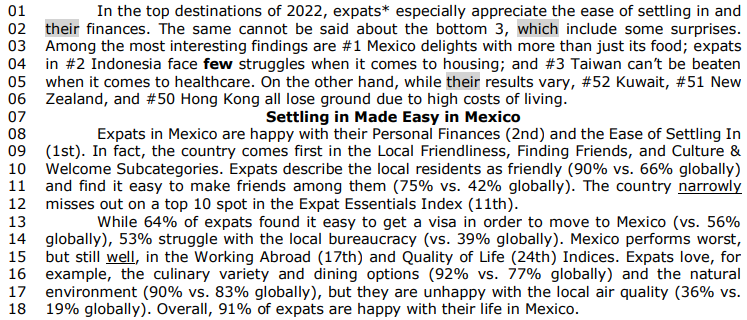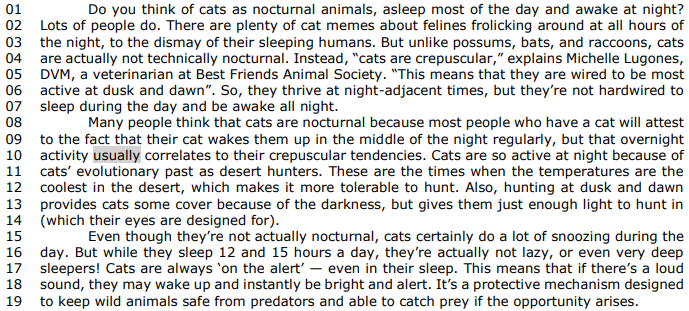Questões de Concurso
Sobre pronome possessivo adjetivo | possessive adjective em inglês
Foram encontradas 83 questões
Read the following text carefully.
Despite _______desire to explore new places, neither Clara nor Liam is willing to compromise on comfort.______ are both cautious, so______ choose destinations with well-established amenities. However, their differing tastes mean that one of _____often ends up conceding to the other’s preferences, even though _______have similar ideas of what makes a perfect vacation.
Choose the following option with five pronouns that complete the text correctly
Read Text II and answer question
University Degree Sill Best Way into Good Job
How do you get a good job? It might literally be a milliondollar question. And researchers from Georgetown University in the US have an answer: the best way is still to get a college education, even if you're a little late. That's their simple answer – one they came up with after looking at US government data for more than 8,000 Americans who were born in the early 1980s. They found that getting a bachelor's degree by the age of 26 gave people a 56% chance of getting a good job by the age of 30. For their study, the researchers defined a "good job" as one paying at least $ 38,000 for workers under the age of 45.
According to The Wall Street Journal, the research didn't focus on people who went straight to college after finishing high school because they already have a high chance of getting a good job. Instead, it looked at different pathways that people who didn't go straight to college after high school could take to increase their chances of getting a good job. For example, even just beginning a bachelor's degree by age 22 increased the likelihood of getting a good job by 16 percentage points, according to the report. But despite this evidence, according to a separate Wall Street Journal survey, more than half of people don't feel that doing a four-year degree is worth the cost, because students may finish without specific job skills and with a large amount of debt.
According to US News, in the academic year that ended in the summer of 2023, the average cost of going to an American university for a year started at about $ 10,000 for a public university, and went as high as almost $ 40,000 for a private school. And Zach Mabel, one of the authors of the Georgetown report, admits that although a university education is likely to be beneficial, for financial reasons "the risk of pursuing higher education is higher than it's ever been."
Source: https://engoo.com.br/app/daily-news/article/study-university-degree-stillbest-way-into-good-job/crbIxBR3Ee6ComdOtgdXYw
I. Her aunt will be vacating next week.
II. That toy on the shelf is mine.
III. Did you do it yourself?
IV. She is the girl I was talking to you about.
V. I am going home today evening.
VI. All my friends are coming home for my birthday party.
In the order they were respectively underlined and written in bold letters, the pronouns written in the sentences above have specific functions, check the answer whose pronouns types are correspondent to the ones read above.
"Evenings unfold as a balancing act, where Maria strives to maintain a harmonious equilibrium between her career and personal life."
A - Is that notebook _______ (your/yours)? B - I encountered _____ (his/theirs) sister at the park last Sunday, can you believe it? C - Has Lucy seen ___ (my/mine) coat?
In the order presented, the gaps are correctly and respectively filled by:
A lawyer used ChatGPT to prepare a court filing. It went horribly awry.
A lawyer who relied on ChatGPT to prepare a court filing on behalf of a man suing an airline is now all too familiar with the artificial intelligence (AI) tool’s shortcomings — including its propensity to invent facts.
Roberto Mata sued Colombian airline Avianca last year, alleging that a metal food and beverage cart injured his knee on a flight to Kennedy International Airport in New York. When Avianca asked a Manhattan judge to dismiss the lawsuit based on the statute of limitations, his lawyer submitted a brief based on research done by ChatGPT.
While ChatGPT can be useful to professionals in numerous industries, including the legal profession, it has proved itself to be both limited and unreliable. In this case, the AI invented court cases that didn’t exist, and asserted that they were real. The fabrications were revealed when Avianca’s lawyers approached the case’s judge, saying they couldn’t locate the cases cited in Mata’s lawyers’ brief in legal databases.
“It seemed clear when we didn’t recognize any of the cases in their opposition brief that something was amiss,” said the airline’s lawyer. And soon they figured it was some sort of chatbot of some kind. On the other hand, the passenger’s lawyer said that it was the first time he’d used ChatGPT for work and, therefore, he was unaware of the possibility that its content could be false.
Internet: <www.cbsnews.com> (adapted).
Based on the preceding text, judge the item that follow.
It is correct to infer from the text that, due to the lawyer’s expertise, he had used ChatGPT for work before.
Julgue o item subsequente.
Possessive nouns, expressing ownership or association,
play a vital role in sentence structure. Understanding how
to form possessives, whether through apostrophes or
other constructions, ensures grammatical accuracy.
Proficiency in handling possessive nouns contributes to
clear and effective communication in written and spoken
English.

I. The excerpt contains both a comparative and a superlative structure. II. To convey the opposite meaning, it would be grammatically correct to replace the superlative structure with “the less interesting” or “the more boring”. III. The word “its” is a possessive adjective. IV. There would be no significative changes in meaning if the word “among” were replaced by “between” because they are always interchangeable.
Which statements are correct?


